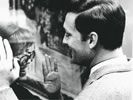Eye For Film >> Movies >> The Fire Within (1963) Film Review
For Le Feu Follet (often translated as The Fire Within), Louis Malle brings his two Lift To The Scaffold stars together again. Maurice Ronet gives a towering performance as Alain Leroy, a suicidal ex-alcoholic. Jeanne Moreau plays a supporting role, a bohemian art-lover from Leroy's playboy past. They meet in a scene that embodies Leroy's isolation. She is in a small art gallery viewing an exhibition of Kadinsky's work when he attracts her attention from the street. He tries to speak to her through the thick pane of glass and she also lowers her glasses to look at him. Although she is a breath of fresh air compared to many of his old friends, he castigates her and her arty friend Urcel for their love of art, calling his paintings 'empty alibis'. Leroy is not only saying goodbye to all his friends. He is saying goodbye to the excuses that make life worth living.
Alain has been holed up in an expensive clinic in Versailles. His ex-wife (in New York) pays the bills and sends a friend, Lydia, to see how he's doing. In the film's opening scene, he and Lydia are making love. As he stares at her, we too are invited to enjoy looking at Lydia. The profound searching, questioning gaze and dialogue also pulls us into seeing things from Alain's viewpoint. This remarkable feat of interiorisation sets the movie apart within the first few minutes. It's going to be one of those deep reflective European films. Arthouse joy and mainstream tedium. But if your taste is with the former, this is one of Louis Malle's best.

Le Feu Follet might easily be compared to Mike Figgis' Leaving Las Vegas, in which Nicholas Cage plays a suicidal alcoholic in the best performance of his career to date. Alain Leroy, like Cage's character, also seeks solace in women, first begging Lydia to stay and then trying to latch on to Solange, another ex. But Le Feu Follet seems more true to life. The women are sensible enough to avoid him for anything more than a carefully time-limited interaction. They are not drawn into his world for more than a brief moment.
With almost Godard-like intensity, the film bombards us with quasi-philosophical arguments, however inappropriate. The inmates at the clinic debate Aristotle over dinner. Alain's conversation is peppered with the sort of epigrams one might expect of an Oxbridge alumnus fed on classics. He debates respective approaches to life with his old friend Dubourg, an Egyptologist who has exchanged the fire of youth for family life, contentment and stability. They debate the worth of his new-found leisurely approach. To Alain, it lacks fire. And Dubourg's justifications are ultimately rejected by Alain as 'mediocre certainties.' It is a diatribe against the bourgeoisie.
On the one hand, Alain has been cured. He is no longer an alcoholic. But life within the clinic has a nurturing simplicity. Alain knows that, once ejected, he will relapse. If incipient depression were not the underlying problem, everything else might be easy. But no-one, not even his doctors, seems to recognise that.
But if Le Feu Follet is such a convincing character study – and yet one of such hopelessness – we should maybe ask what the point is. Perhaps it is the mental effort we expend in trying to see a way out. What is wrong with Leroy's viewpoint, intellectually? He shows the emptiness of all other approaches. When someone suggests he do something mundane that he had once sought – opening a shop – he is able to point out that he is deeply in debt. His desire for truth, for honesty, for the fire inside, is moving. We really do have to work hard to say what is wrong with it.
To me, the answer is that his fire is unformulated. It might be obvious to him, and the film makes it intuitively obvious to the viewer, but that is not the same as stating it in more viable, rigorous terms. It is almost as if Alain's fire dies before it has fired him up. Take Schopenhauer, Freud, famous pessimists. They fashioned their 'fire' into a coherent body of work. Alain could have used his latter days in the clinic to plan a rationale with which to embrace the world outside on his own terms. But his fire was too much of the Will o' the Wisp variety (another of the film's international titles).
Yet his hedonism is certainly appealing. I watched Alain and Lydia inhale their smokes after their hot sex. I thought back to the time when I used cigarettes and rather enjoyed the sensation...
Reviewed on: 26 May 2008


















